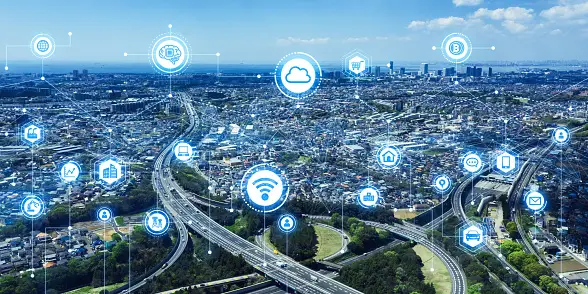Implementing IoT for Urban Development In Smart Cities 2024

Implementing IoT for Urban Development In Smart Cities 2024? In the rapidly evolving landscape of urban development, the integration of the Internet of Things (IoT) has emerged as a transformative force. As we delve into the intricacies of smart cities in 2024, the role of IoT becomes increasingly pronounced.
Table of Contents
ToggleUnderstanding IoT in Urban Development
At its core, IoT refers to the network of interconnected devices and sensors that collect and exchange data. When applied to urban development, it involves the seamless integration of these technologies into the existing infrastructure.
Key Components of IoT in Smart Cities
Sensors and Devices
The foundation of IoT lies in the deployment of sensors and devices throughout the city. These range from smart streetlights to environmental monitoring systems, creating a network that constantly gathers valuable data.
Data Analytics and Processing
The collected data is meaningless without sophisticated analytics and processing capabilities. Advanced algorithms sift through the information, providing actionable insights for city planners and administrators.
Connectivity and Communication Networks
The backbone of any IoT system is the communication network that facilitates data transfer. High-speed, reliable connectivity ensures real-time communication between devices, enabling swift responses to emerging issues.
Benefits of Implementing IoT in Urban Development
Improved Efficiency in Resource Management
Smart cities leverage IoT to optimize resource allocation, leading to more efficient energy consumption, waste management, and traffic control.
Enhanced Public Services
IoT enables the delivery of improved public services, from smart transportation systems that reduce congestion to healthcare innovations that enhance the well-being of residents.
Sustainable and Eco-friendly Practices
The adoption of IoT fosters sustainability by promoting eco-friendly practices. From smart grids to waste reduction initiatives, smart cities prioritize environmental conservation.
Challenges and Solutions
The journey towards smart cities is not without obstacles. Security concerns and privacy issues demand innovative solutions, ensuring that the benefits of IoT do not compromise citizen safety or privacy.
Success Stories
Cities worldwide have witnessed positive transformations through effective IoT implementation. From Barcelona’s smart parking systems to Singapore’s efficient waste management, success stories abound.
Future Trends in IoT for Urban Development
As we peer into the future, emerging technologies such as 5G and AI are poised to further revolutionize the landscape of smart cities. Anticipated advancements promise even greater connectivity and efficiency.
Regulatory Framework for IoT in Smart Cities
Government policies and regulations play a pivotal role in shaping the trajectory of IoT in urban development. Establishing compliance standards ensures responsible and ethical implementation.
Case Study: A Model Smart City
Examining a city that has effectively implemented IoT provides valuable insights. From planning strategies to community engagement, a model smart city offers replicable solutions for others.
Community Involvement and Engagement
The success of smart cities hinges on active community participation. Initiatives that involve residents in decision-making processes contribute to the overall success of urban development projects.
Financial Implications
Investment in IoT projects necessitates a comprehensive understanding of financial implications. Exploring the economic benefits that arise from enhanced efficiency and improved services is crucial for city planners.
Environmental Impact Assessment
As cities strive for progress, it is imperative to assess the ecological consequences of IoT implementation. Strategies that minimize the environmental footprint ensure a sustainable and responsible future.
Measuring Success: Key Performance Indicators
Establishing metrics for evaluating the success of IoT projects is essential. Real-world impact on urban living, from reduced traffic congestion to improved air quality, serves as tangible evidence of progress.
Read More: From Sensor to Cloud: A Guide to IoT Data Transmission In 2024
Future Challenges and Innovations
While the path to smart cities is marked by successes, anticipating future challenges and fostering innovations is key. Addressing hurdles and embracing new technologies will shape the continued evolution of urban landscapes.
Conclusion
In conclusion, the integration of IoT in urban development is not just a technological leap; it is a paradigm shift. As smart cities continue to evolve in 2024, the seamless interplay of technology, community engagement, and regulatory frameworks will determine the success of these endeavors.
Get Access Now: https://bit.ly/J_Umma
FAQs : IoT for Urban Development
How secure is the data collected in smart cities using IoT?
Smart cities employ robust security measures to safeguard collected data, including encryption and authentication protocols.
What role does community involvement play in the success of smart city projects?
Community involvement is crucial for the success of smart city projects as it ensures that development aligns with the needs and preferences of residents.
How do smart cities address privacy concerns related to IoT?
Smart cities implement strict privacy policies, anonymize data, and provide transparent communication to address privacy concerns.
Are there any environmental downsides to implementing IoT in urban areas?
Smart cities conduct thorough environmental impact assessments to minimize downsides, focusing on sustainable and eco-friendly practices.
What are the economic benefits of investing in IoT for urban development?
Investing in IoT leads to economic benefits through enhanced efficiency, reduced operational costs, and improved public services.











